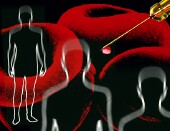 |
 |
 |

2 Cardiovascular Proteins Tied to Severity of Alzheimer's
Their interaction cuts blood flow to brain, limiting its ability to shed plaques|
|
HealthDay
By Robert Preidt
Monday, December 22, 2008
 MONDAY, Dec. 22 (HealthDay News) -- U.S. researchers have spotted two proteins that deliver a double hit to the brain function of Alzheimer's disease patients.
MONDAY, Dec. 22 (HealthDay News) -- U.S. researchers have spotted two proteins that deliver a double hit to the brain function of Alzheimer's disease patients.
The proteins -- SRF (serum response factor) and myocardin -- lessen blood flow in the brain and reduce the rate at which the brain is able to remove amyloid beta, the protein that accumulates in damaging quantities in the brains of Alzheimer's patients, say a team from the University of Rochester.
The findings provide firm evidence directly linking two processes believed to play a role in Alzheimer's: a reduction in blood flow and a buildup of toxic amyloid beta. The interaction between the two proteins could prove an effective target for treatment.
The researchers said they were surprised to discover that two proteins known for their role in the cardiovascular system were major factors in the development of Alzheimer's disease.
The study was published online Dec. 21 in the journal Nature Cell Biology.
"This is quite unexpected," senior author and Rochester neuroscientist Dr. Berislav Zlokovic, said in a journal news release. "On the other hand, both of these processes are mediated by the smooth muscle cells along blood vessel walls, and we know that those are seriously compromised in patients with Alzheimer's disease, so perhaps we shouldn't be completely surprised."
HealthDay
Copyright (c) 2008 ScoutNews, LLC. All rights reserved.
Related News:
More News on this Date
Related MedlinePlus Pages:
| Home | Health Topics | Drugs & Supplements | Encyclopedia | Dictionary | News | Directories | Other Resources | |
| Disclaimers | Copyright | Privacy | Accessibility | Quality Guidelines U.S. National Library of Medicine, 8600 Rockville Pike, Bethesda, MD 20894 National Institutes of Health | Department of Health & Human Services |
Date last updated: 23 December 2008 |




